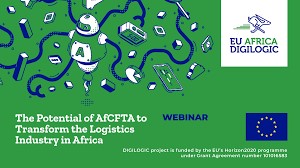DIGILOGIC invited three experts across Africa: Gugulethu Siso, CEO of Thumeza, a startup providing working capital financing for those who power the movement of goods across Africa; Ify Ogo, Regional Coordination Specialist of the African Continental Free Trade Area (AfCFTA) at UNDP, Ghana; and Bosco Haule, Head Ports Operations, Africa Global Logistics, Tanzania to discuss on how the removal of trade barriers and the creation of a single market is impacting the logistics sector with the potential to transform the industry in Africa.
The webinar was moderated by Charlotte Edzard, Innovation Coach at Digital Logistics Hub, Dortmund, who is also the DIGILOGIC project coordinator and Markus Witthaut Senior Researcher Supply Chain Strategy & Development at Fraunhofer IML.
The experts shared their experiences addressing questions about the greatest challenges in the logistics industry in Africa, their involvement in the implementation of the AfCFTA, how the AfCFTA affects the development and implementation of innovations and technologies in the sector in Africa, and how inadequate transport infrastructure, lack of skilled workforce and fragmentation of markets have been affecting the potential of AfCFTA to transform the African Logistics Industry.
The emergence of AfCFTA has spurred awareness in innovation and technology within Africa. In the last few years, Africa has witnessed an incredible digital transformation, industrialisation, and investment at a macro, national and international level. AfCFTA is indeed facing tremendous challenges across Africa, ranging from security, lack of infrastructure, public policy, international agreement and the law of the land to mention a few.
According to Bosco, the major challenges in the industry are lack of infrastructure, technological gap within the African logistics industry, leadership willingness and settlements of funds. In Africa, Gugu mentioned that, “dispute resolution between two parties can cost a lot and is time consuming”. Setting up industry standards that can address these issues can reduce the problems. Ify added that “Perhaps not every problem can be tackled with fintech especially in logistics, although tech has transformed the sector, and provided solutions to many challenges”.
One of the objectives for the implementation of AfCFTA is to eliminate trade barriers and boost intra-Africa trade. In particular, it is to advance trade in value-added production across all service sectors of the African Economy. We believe despite these challenges, AfCFTA is working towards achieving its objectives of “The Africa We Want”!


